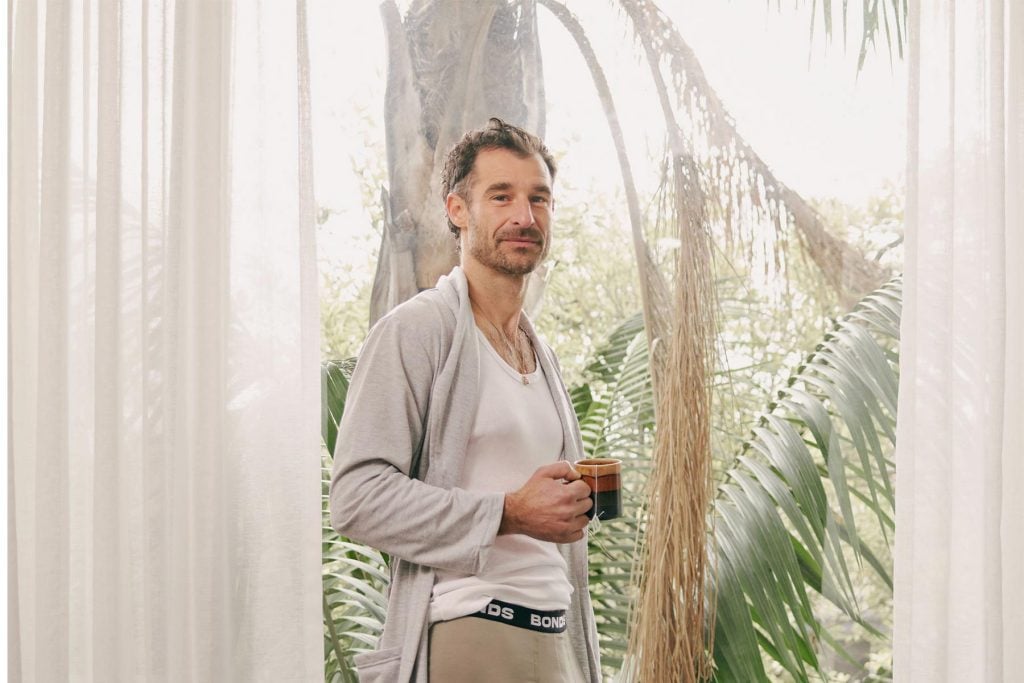Rolling Stone Australia and Bonds created a Father’s Day calendar to raise funds for Support Act. Felix Riebl appears in the calendar with his greatest support, partner Eloise Mignon.
Felix Riebl; as told to Rolling Stone Australia’s Augustus Welby
Rolling Stone and Bonds’ Father’s Day calendar features members of the bands Clowns, Short Stack, the Pierce Brothers and the Cat Empire’s Felix Riebl. They’re all pictured wearing Bonds’ new Total Package™ underwear, pairs of which include the Total Support Pouch™ for neat downstairs organisation.
Proceeds from the calendar will go to the music industry charity, Support Act, which provides financial and mental health services for musicians, managers and crew. Each of the featured musicians has taken this opportunity to shout out one of their greatest supports, someone who’s been there to enhance their music industry experience and boost general wellbeing.
Felix Riebl’s new solo album, Everyday Amen, will be released on Friday 25th November. Riebl is also preparing to relaunch the Cat Empire, with a new lineup surrounding him and pianist Ollie McGill.
Here, Riebl expands on the invaluable support he receives from long-term partner, Eloise Mignon, and their two children, Anya, 5, and Fidel, 2.

Felix Riebl’s greatest supports
Everyday Amen is an album that explores the line between this international career that I’ve had, mostly through the Cat Empire, playing cities around everywhere and this sort of extrovert existence that that’s involved, and then the really subtle world of the domestic.
Love Music?
Get your daily dose of everything happening in Australian/New Zealand music and globally.
I found it really quite beautiful to look at moments in my family life with Eloise and our children, Anya and Fidel, that are other. “Everyday Amen,” the song and the concept, it’s really about finding magic in everyday moments. Moments where something is strange or something is funny or something is just peculiar and all of a sudden it becomes alive.
Sometimes it’s more rock’n’roll at breakfast time than it is backstage at a festival, just by the exuberance and the overflowingness of something that happens or the humour and language that you get within a family, especially with young children. It’s mad. Eloise is my partner and she’s the mother of my children and she shares in that language with me.
Earlier on in my career, those two worlds, the international and the domestic world, felt quite different to me. It would be hard to go from one extreme to the other. And I think as soon as I had children, everything really turned on its head.
What music is about, in that performing space, is, it’s not your glass is half-full or your glass is half-empty—your cup is overflowing. You want to get into a space where things are overflowing. That’s what great performances do for the performers and the audiences, and I think that was a kind of a drug for me when I was just a performer and I had that sort of life.
But when I had children, you realise that they bring that overflowing cup to just about every situation. You know, when they’re angry they scream, when they’re happy they laugh. They invent words. This language develops within a family that exhausts you. So as soon as I had kids, those worlds became blurred and I think that’s probably what informed the joy of Everyday Amen for me.
The world didn’t reduce for me when I had children. Lots of people would say, “Oh, you know your life will change.” But actually what having kids did for me was give me more of what I loved, which is an experience of life that is overflowing—good, bad, ugly, strange, fun; whatever it is. Just an excess of emotion.
I’m in a space in my life where I’m confident writing and I enjoy writing and I enjoy music more than I ever have. That’s probably loosely affiliated with having a family, because there’s an emotional world that opens up there that’s really fertile. It provides a new depth of experience or of life force.
Having a family has brought me closer to what I think is a more important task, which is to really put a currency on experience as opposed to outcomes all the time. Music in its essence, when you’re performing or playing or writing well, you’re attempting to find a flow, and that flow is something other than yourself.
Music, in its best form, you depart yourself and you enter into some strange collective. And I think that that’s also something that runs in a family.



































